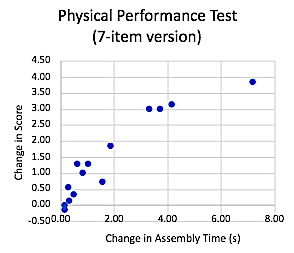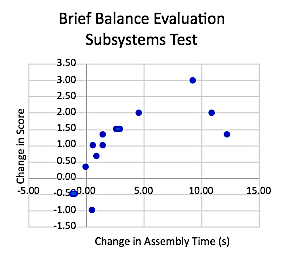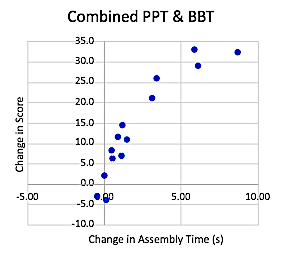Objective: Alexander technique (AT) is a mind-body training that links inhibition, body schema, proprioception, and goal awareness to increase agency and enhance daily function. We tested whether a remote-delivery AT-based course for people living with Parkinson’s disease (PWP) would improve proactive inhibitory control and whether this would correlate with improved functional outcomes.
Background: Previous studies with PWP showed that even brief exposure to AT principles can improve head carriage, step initiation, and axial tone[1]. An RCT of 1:1 AT sessions led to reduced motor symptoms with retention at 6 months[2,3]. AT-based group courses led to improvement in motor symptoms and confidence with retention at 6 months[4,5]. An AT group course for older adults showed feasibility for improving balance[6]. A hallmark of AT training is the idea that motor plan assembly is crucial, so pausing for a few moments to organize themselves before initiating an activity could hypothetically improve coordinated movement for PWP.
Method: Design: 3 online groups met for 90-105 min, twice/wk, for 8-9 wks. Participants: 16 PWP began course; 14 completed. Intervention: Courses (via Zoom) taught self-management strategies using lecture, demonstration, and guided individual and partnered activities that embedded AT principles in everyday acts. Outcome Measures: balance (Brief BESTest, BBT), mobility (7-item Physical Performance Test, PPT), and “assembly times.” After describing each task, the assessor said, “Let me know when you are ready.” “Assembly time” was defined as the interval between this question and the subject’s verbal “ready” response, assessed from session recordings.
Results: Performance improved in BBT (p=.006) and PPT (.001). BBT assembly times increased ~ 3.2 seconds per task (p=.02). PPT assembly times increased ~ 1.8 seconds per task (p=.005). There was a correlation (p<.0001) between improved scores and increased assembly times in BBT (r=.71, p=.007) and in PPT (r=.93, p<.00001), with a ceiling around 7 seconds after which there was a decline in performance [graphs1-3].
Conclusion: The strong correlation between assembly time increases and motor performance improvement found in this study supports the hypothesis that pausing to coordinate oneself rather than launching immediately into activity is a beneficial Alexander technique based strategy for PWP.
Graph 1: Physical Performance Test Correlations
Graph 2: Brief BESTest Correlations
Graph 3: Combined PPT & BBT Correlations
References: 1. Cohen RG, Gurfinkel VS, Kwak E, Warden AC, Horak FB (2015). Lighten up: Specific postural instructions affect axial rigidity and step initiation in patients with Parkinson’s disease. Neural Rehabilitation & Neural Repair, 29(9), 878-88.
2. Stallibrass C, Sissons P, Chalmers C (2002). Randomized controlled trial of the Alexander technique for ideopathic Parkinson’s disease. Clinical Rehabilitation, 16(7):695-708.
3. Stallibrass C, Frank C, Wentworth K (2005). Retention of skills learnt in Alexander technique lessons: 28 people with ideopathic Parkinson’s Disease. Journal of Bodywork and Movement Therapies, 9:2, p. 150-157.
4. Gross M., McMinnis M., Norcia, M., Ravichandra, R., Basye, M., Abdelrahman, A, Cohen R.G. (2020). “Poised for Parkinson’s: Alexander technique group course improves posture, balance and mobility for people living with PD”. Movement Disorders 7(S1): Abstract 135.
5. Gross, M., Cohen, R.G., Lazaro, S., Basye, M., Achabal, A., Norcia, M. (2020). ‘Poised for Parkinson’s’: Retention of Benefits from Alexander Technique Group Course for People Living with Parkinson’s Disease. Archives of Physical Medicine and Rehabilitation 101 (12), e149.
6. Batson G, Barker S (2008). Feasibility of group delivery of the Alexander technique on balance in the community-dwelling elderly: preliminary findings. Activities, Adaptation & Aging, 32(2), 103-119.
To cite this abstract in AMA style:
M. Gross, R. Cohen, C. Condie. Alexander technique remote-delivery group course for people living with Parkinson’s improves motor plan assembly time with correlated improvement in function [abstract]. Mov Disord. 2024; 39 (suppl 1). https://www.mdsabstracts.org/abstract/alexander-technique-remote-delivery-group-course-for-people-living-with-parkinsons-improves-motor-plan-assembly-time-with-correlated-improvement-in-function/. Accessed February 23, 2026.« Back to 2024 International Congress
MDS Abstracts - https://www.mdsabstracts.org/abstract/alexander-technique-remote-delivery-group-course-for-people-living-with-parkinsons-improves-motor-plan-assembly-time-with-correlated-improvement-in-function/



